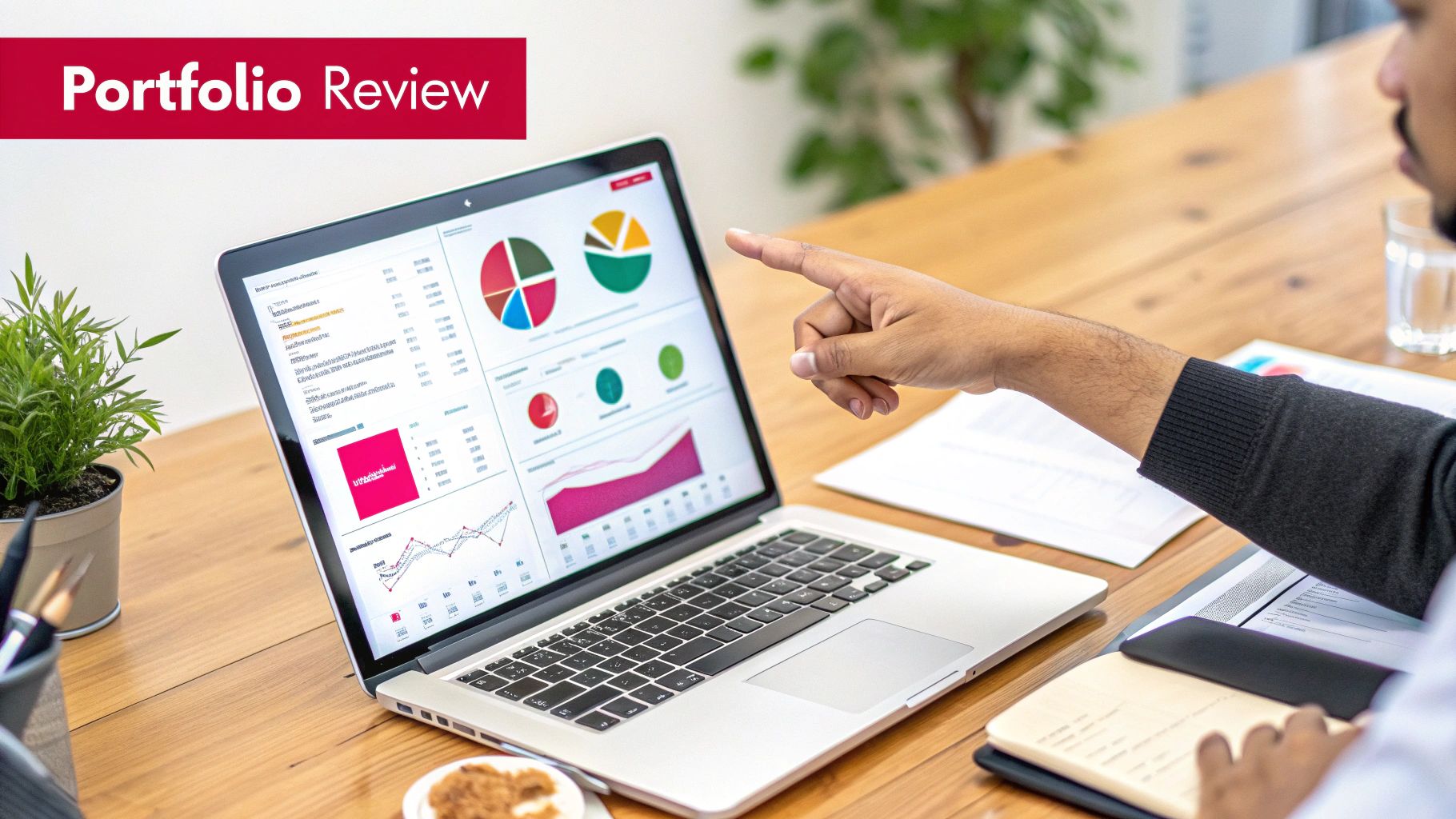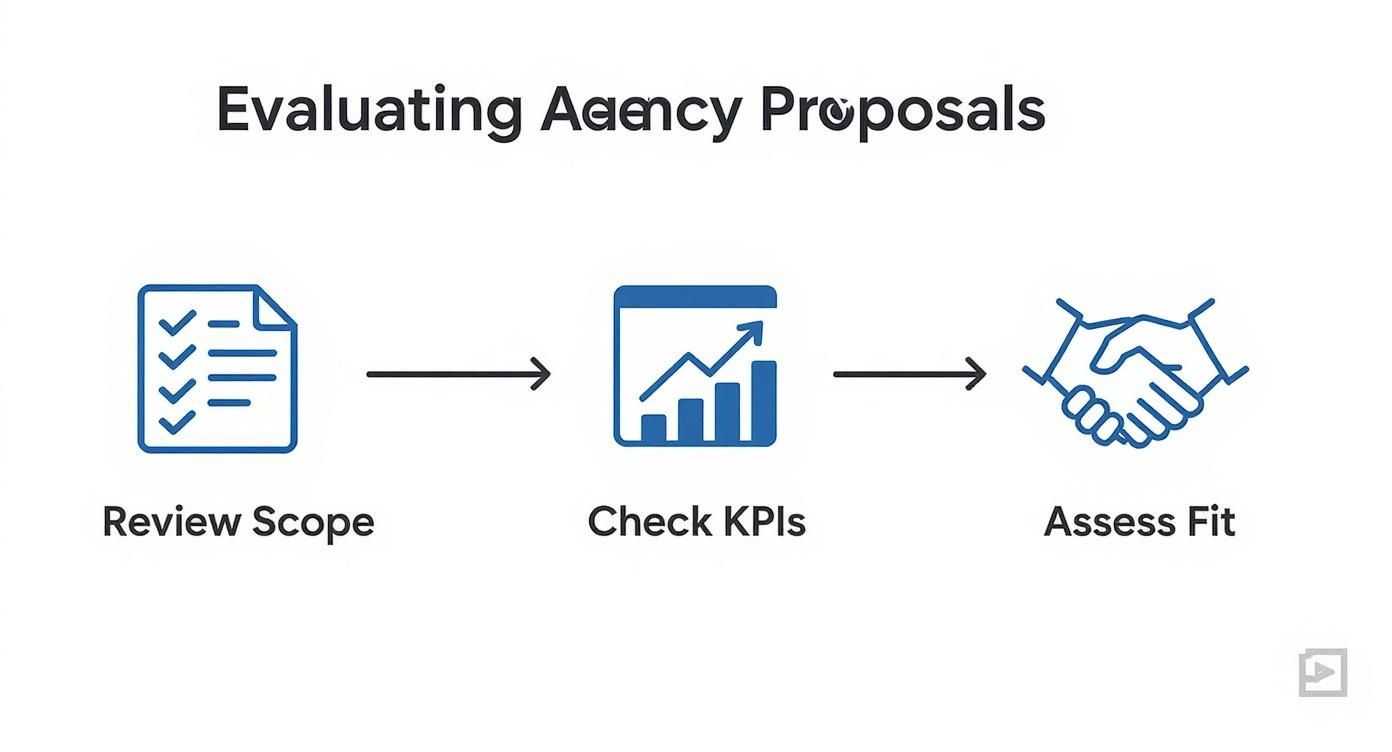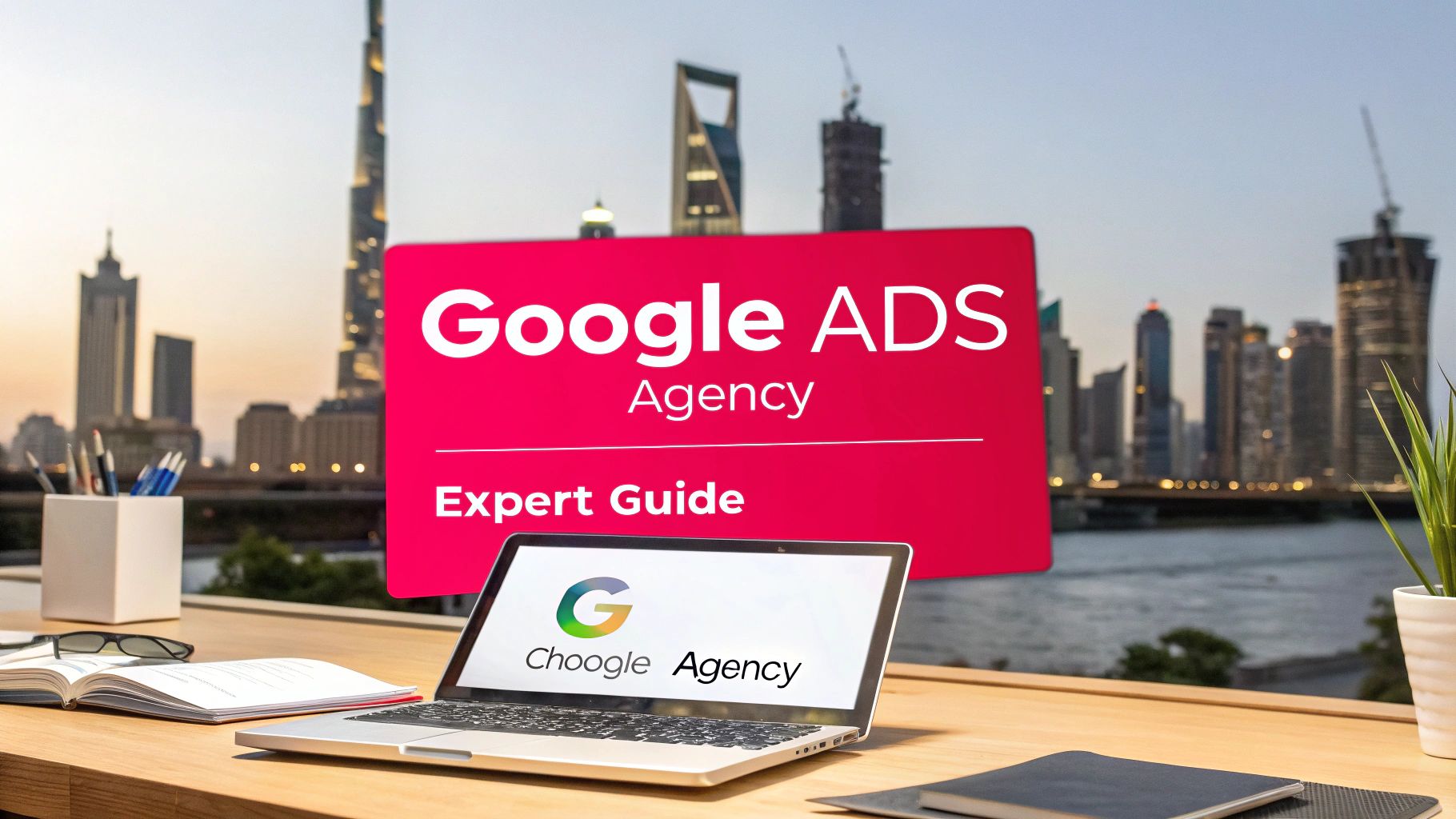An e-commerce agency is your dedicated partner in growth. They're a specialised team focused on one thing: helping online businesses thrive. From developing your website to executing digital marketing campaigns and shaping your overall strategy, their job is to boost your sales, enhance the customer experience, and scale your brand in a crowded market.
Defining Your E-commerce Goals and Budget

Before you even think about shortlisting agencies, you need to look inward. Seriously. Walking into a discovery call without a clear vision is like starting a road trip with no destination in mind—you’ll burn through time and money and likely end up nowhere you wanted to be.
This groundwork is all about creating a solid brief. A well-thought-out brief doesn't just make your search easier; it allows agencies to give you sharp, relevant proposals. It’s the single best way to avoid a costly mismatch and make sure you’re all on the same page from day one.
Audit Your Current Digital Footprint
First things first, take an honest look at where you stand online right now. A quick audit will show you what’s working, what’s falling flat, and where your best opportunities are hiding. This isn't about getting lost in technical jargon; it's a high-level review of your business performance.
Start by asking a few candid questions:
- What are our biggest strengths? Maybe you’ve built a great social media community, but your website’s conversion rate is dismal.
- Where are the most obvious weaknesses? Is your site design stuck in 2015? Is the checkout process so clunky that you’re losing customers at the final step?
- What are our key business objectives for the next year? Are you trying to grow revenue by 30%, launch into a new market, or get customers to come back and buy more often?
- Who is our ideal customer? Do we really understand their needs, frustrations, and how they behave online?
This self-assessment is the foundation for setting concrete goals an agency can actually work with. For instance, knowing that smartphone penetration in the UAE and GCC is over 96% could lead to a clear goal: optimise the entire shopping experience for mobile to capture that massive, on-the-go audience.
A clear objective isn't "we want more sales." A clear objective is "we want to increase our average order value by 15% in the next six months by improving our cross-selling strategy."
Establish a Realistic Budget
With your goals in focus, it’s time to talk money. What can you realistically invest? Your budget will determine the kind of agency you can bring on board. This isn't about plucking a number out of thin air; it's about matching your financial resources to your ambitions.
Think about what you truly need. Are you looking for a long-term, full-service partner on a monthly retainer, or do you need a specialist for a one-off project like a website rebuild? Getting a handle on how to build a marketing budget for your small business is a crucial piece of this puzzle.
A smart budget keeps your expectations grounded and helps you judge agency proposals on the value they deliver, not just their price tag.
Digging Into an Agency’s Portfolio and Real-World Expertise

Alright, you’ve done the internal work. You know what you need and what you can spend. Now it's time to turn that focus outward and start the real investigation. This is where you move past the slick sales pitches and glossy brochures to figure out which agencies can actually deliver the goods.
The best place to start is always an agency's portfolio. Think of it as their greatest hits album. But you can't just skim the tracklist; you need to listen closely for work that truly resonates with your brand’s specific challenges and goals.
Look for Directly Relevant Industry Experience
A beautiful portfolio is one thing, but relevant experience is everything. If you're selling luxury skincare, an agency whose star client is a discount car parts store probably isn't the right fit. They just won't get the nuances of your customer, your brand voice, or your market.
You're looking for proof they've successfully navigated a landscape similar to yours. Seeing concrete examples, like reviewing samples from their online dog food project, gives you something tangible to evaluate. It’s far more telling than a vague claim of "e-commerce success."
An agency with a track record in your industry already gets it. They know your audience, understand the competitive pressures, and are familiar with the benchmarks for success. That means they're not learning on your dime.
Scrutinise Case Studies for Hard Evidence
This is where the rubber meets the road. Testimonials are nice, but a solid case study tells a story backed by data. It connects the agency's pretty designs and clever campaigns to actual business results.
Here’s what to look for when you're digging into a case study:
- The Problem: Did they actually understand the client's initial challenge? A clearly defined problem shows they're strategic thinkers, not just task-doers.
- The Plan: What, specifically, did they do? Look for the details of their process—was it a full site migration, a targeted paid search campaign, or a content-driven SEO strategy?
- The Proof: This is non-negotiable. The case study must have hard numbers. "We increased traffic" is a massive red flag. You want specifics like, "We grew organic revenue by 85% in six months" or "We lifted the conversion rate from 1.2% to 2.5%."
A great case study doesn't just show what an agency did. It explains why they did it and proves, with measurable data, that it worked. It’s a window into their strategic thinking and their focus on ROI.
Assess Their Technical Chops and Team Depth
Finally, it's time to look behind the curtain at the people and the platforms. An agency is only as good as its team and their command of the right tools.
Do they specialise in Shopify, Magento (Adobe Commerce), or WooCommerce? Their technical expertise has to line up with your current tech stack or the one you plan to build.
Don't be shy about asking about the team, either. Who will be your main point of contact? What are the credentials of the developers, marketers, and strategists who will actually be working on your account? A transparent, confident agency will happily introduce you to the team and walk you through their experience. You need to feel certain they have the horsepower to bring your vision to life.
E-commerce Agency Evaluation Checklist
To help you stay organised and compare agencies on a level playing field, use a checklist. This simple tool prevents you from getting distracted by a flashy presentation and keeps you focused on the criteria that truly matter for your business.
| Evaluation Area | What to Look For | Red Flags to Watch Out For |
|---|---|---|
| Industry Relevance | Case studies or portfolio pieces in your niche or a closely related one. They should "speak your language." | A portfolio filled with industries that have completely different business models or customer profiles from yours. |
| Proven Results | Data-driven case studies with specific KPIs, percentages, and revenue figures (e.g., "Increased AOV by £15"). | Vague claims like "improved engagement" or "boosted sales" without any numbers to back them up. |
| Strategic Thinking | Clear explanations of the why behind their strategies. They should be able to articulate the business problem they were solving. | A focus solely on deliverables (e.g., "we built 5 landing pages") without connecting them to a larger strategic goal. |
| Technical Proficiency | Deep expertise in your specific e-commerce platform (Shopify, Magento, etc.). Certifications are a plus. | Being "platform agnostic" can sometimes mean they're masters of none. Push for specifics on their platform experience. |
| Team Expertise | Direct access to the specialists who will work on your account. Clear roles and documented experience for key team members. | A bait-and-switch where you only meet senior partners during the sales process but are handed off to a junior team later. |
Using a structured approach like this ensures you're making a decision based on evidence and alignment, not just a gut feeling. It’s the best way to find a partner who will become a true extension of your team.
Deconstructing Agency Proposals and Pitches
Once the proposals start hitting your inbox, the temptation is to flip straight to the last page and check the price tag. I get it. But you've got to resist. A proposal is so much more than a quote—it’s your first real glimpse into how an agency thinks. It tells you if they were actually listening or if you’re just another name on their spreadsheet.
The best proposals I've seen don't just list a bunch of services. They tell a compelling story, connecting every single recommendation back to the business goals you talked about. If you get a generic, copy-and-paste document, that’s a huge red flag. It’s a sign you're about to be crammed into a one-size-fits-all box, and those rarely work out.
Reading Between the Lines of the Proposal
To really tear a proposal apart, you have to look past the surface-level deliverables and understand the why behind their plan. A great e-commerce agency will lay out a clear roadmap showing how their proposed work leads directly to the results you want.
Here's where to focus your attention:
- Scope of Work: How specific is it? If you see something vague like "SEO services," push back. You want to see concrete details, like "conduct a full technical site audit, perform keyword research for 20 primary commercial terms, and build 10 high-authority backlinks per month." Specificity shows they've thought it through.
- Strategy and Rationale: Do they explain why they chose this path for you? A solid agency will back up their strategy with data, insights about your market, or by referencing the exact pain points you shared with them.
- Key Performance Indicators (KPIs): This is crucial. How are they defining success? The KPIs should be things that actually matter to your bottom line—revenue, conversion rate, customer lifetime value—not just vanity metrics like impressions or clicks that don't pay the bills.
Vague proposals almost always lead to vague results. A detailed, thoughtful document is proof that an agency has already invested time in understanding your business and feels confident they can deliver real value.
Asking the Right Questions in Follow-Up Calls
The proposal is just the opening act. The real test comes during the follow-up call. This is your chance to dig in, poke holes, and see if their strategic thinking is as solid as it looks on paper. Don't be shy about challenging their assumptions.
Come prepared with a list of questions that force them to think on their feet and demonstrate they get your specific situation. The quality of their answers will quickly separate the true partners from the order-takers.
Questions to Uncover Their Strategic Depth
Here are a few of my go-to questions that cut through the fluff:
- "Based on what you know about us so far, who do you see as our main competitors, and what's their biggest weakness we can go after?" This immediately shows you if they've done their homework and have a sense of commercial awareness.
- "Walk me through your process. What happens when a campaign isn't hitting the initial KPIs we agreed on?" Their answer reveals a ton about their agility, how they solve problems, and whether they're truly committed to performance.
- "How exactly will you report on performance, and how will you tie your team's activities directly to our revenue goals?" This forces them to show you they're focused on ROI, not just keeping busy.
A confident, experienced e-commerce agency will love these questions. They’ll have clear, well-reasoned answers ready to go, giving you a real sense of what it would be like to work with them day-to-day. In fiercely competitive markets, knowing how an agency plans to win new customers is everything. It's often helpful to see how a top lead generation company in Dubai approaches this, as their methods are often tested under intense pressure.
Choosing the Right Agency Service Model
When you’re looking for an e-commerce agency, you’ll quickly find that no two are exactly alike. The way an agency structures its services and pricing says a lot about how they work and what kind of partnership you can expect. This isn't just a minor detail—it will directly impact your budget, how you collaborate day-to-day, and ultimately, the results you see.
Your first major fork in the road is deciding between a full-service agency and a boutique specialist. Think of a full-service partner as your all-in-one e-commerce team. They cover everything from the ground up: website development, branding, SEO, paid ads, you name it. It's a fantastic option if you want a single point of contact and seamless consistency across all your marketing efforts.
On the other hand, a boutique or specialist agency zooms in on one specific area. Maybe they are wizards at conversion rate optimisation (CRO) or they live and breathe email marketing. If you have a very specific problem to solve or a particular channel you want to dominate, their deep, focused expertise can be a game-changer.
Aligning Price with Your Business Needs
Once you’ve got a handle on the type of service you need, the next big piece of the puzzle is the pricing model. This is where you really need to match an agency’s approach to your own company’s financial reality and project goals.
You’ll typically run into three common structures:
- Retainer-based: You pay a fixed fee every month for ongoing work. This is the go-to model for established brands that need continuous strategic input and support. It makes budgeting predictable and helps build a strong, long-term partnership where the agency becomes a true extension of your team.
- Project-based: This is a one-time fee for a clearly defined task, like a website redesign or a holiday marketing campaign. It’s perfect for startups or any business with a specific, short-term goal and a strict budget. You know exactly what you're getting and exactly what it costs.
- Performance-based: With this model, the agency’s pay is tied directly to the results they generate—often a percentage of revenue growth or another key metric. It’s an attractive option because it ensures everyone is pulling in the same direction. Just be aware that it can sometimes require a higher base fee or a longer commitment to make it work for the agency.
This decision tree gives you a simple framework for sorting through agency proposals by looking at scope, performance metrics, and that all-important cultural fit.

As the visual shows, a great partnership is about much more than just the work outlined in a contract. It’s about having a shared definition of success and making sure your teams genuinely click.
Making the Right Choice for Your Stage
So, what does this look like in the real world? A brand-new startup, for instance, would probably do well with a project-based fee to get its first Shopify store off the ground. It keeps costs contained while bringing in expert help right where it’s needed most.
Contrast that with a large, established retailer juggling complex marketing channels and backend logistics. For them, the comprehensive support of a full-service agency on a retainer makes perfect sense.
This is especially critical in fast-moving markets. Take the e-commerce fulfilment sector in the Middle East, which is booming as it races to keep up with customer demands. In 2024, the MEA fulfilment market hit a revenue of about USD 10.8 billion, and it's projected to keep climbing. This shows just how vital it is to work with an agency that gets the local infrastructure and can scale with you. You can find more details about the MEA e-commerce market on expertmarketresearch.com.
An agency's service and pricing model isn't just a line item on a proposal—it’s a direct reflection of how they structure their partnerships. Choose the model that mirrors your business's operational style and growth trajectory.
Finalising Your Decision and Starting the Partnership

You’ve done the heavy lifting—vetting candidates, sitting through pitches, and comparing proposals. Now you’re at the finish line, about to choose your new e-commerce agency.
This last phase is all about final checks and setting the stage for a great working relationship. Getting these final steps right is what separates a frustrating experience from a smooth, successful partnership.
Conducting Meaningful Reference Checks
First things first: talk to their other clients. Any agency worth its salt will happily connect you with a few current or past partners. When you get them on the phone, don't just ask the easy questions.
You need to dig deeper. Prepare a few specific, open-ended questions to get real, honest feedback about what it's really like to work with them.
- "Can you describe their communication and project management style?" This tells you everything about their day-to-day process and whether it will mesh with how your team operates.
- "Tell me about a time you faced a challenge together. How did the agency respond?" An answer here is incredibly revealing. It shows you their problem-solving skills and whether they take accountability when things get tough.
- "What has been the most significant impact they've had on your business?" This brings it all back to results. Did they actually deliver on what they promised?
These conversations will uncover the little things a polished proposal could never tell you.
A final reference check isn’t a formality; it’s your best chance to get a candid, behind-the-scenes look at what it’s truly like to work with an agency. Honest feedback from a fellow business owner is gold.
Scrutinising the Contract and SOW
Once you feel good about your choice, it’s time to look at the paperwork. The contract and the Statement of Work (SOW) are the foundational documents for your entire partnership. Don't just skim them—they're there to protect both you and the agency.
Pay extremely close attention to a few key areas:
- Deliverables and Milestones: The SOW needs to be crystal clear. It should spell out every single task, timeline, and deadline. Any ambiguity here is a red flag and can lead to major headaches down the road.
- Payment Terms: Make sure the payment schedule, how they’ll invoice you, and any performance-based bonuses are laid out plainly.
- Termination Clause: You hope you'll never need it, but you have to understand the notice period and the specific conditions for ending the contract if the partnership isn’t working out.
This is where a truly professional e-commerce agency will shine. Their documentation should be clear, fair, and totally transparent.
Planning a Smooth Onboarding
With the contract signed, it’s time to kick things off. How you start the relationship often sets the tone for everything that follows.
A simple checklist can make the onboarding process seamless. This should include granting the agency access to your analytics, ad accounts, and website backend. Sometimes your new agency will need a hand from a professional website development company to get all the technical integrations set up correctly.
Make sure to schedule a formal kick-off meeting with key people from both your team and theirs. This is your chance to assign a primary point of contact, decide on your main communication channels (like a shared Slack channel or weekly calls), and agree on the top priorities for the first 30 days.
Your E-commerce Agency Questions, Answered
Hiring an agency is a big step, and you’re bound to have questions. Getting straight answers is the only way to feel confident you’re making the right move for your business. We get asked these all the time, so we’ve put together some no-fluff answers to help you navigate those final decisions.
Think of this as your go-to guide for clearing up those last few uncertainties before you sign a contract.
How Much Does an E-commerce Agency Typically Cost?
This is always the first question, and the honest answer is: it’s all over the map. What you'll pay really comes down to the scope of the project, the agency's size and reputation, and how they structure their pricing. A small, one-off project might only set you back a few thousand pounds.
On the other hand, a comprehensive monthly retainer with a full-service agency handling everything from your SEO to paid media can easily run from £5,000 to over £25,000 per month. The key isn't just to look at the price tag, but to weigh it against the value and potential return. Make sure every proposal you review clearly spells out what you’re getting for your investment.
What is the Difference Between an E-commerce Agency and a General Digital Marketing Agency?
It’s a great question, because there’s definitely some overlap. The real difference is that an e-commerce agency lives and breathes the entire online retail world. Their expertise goes way beyond standard digital marketing.
They're experts in specific platforms like Shopify or Magento, they understand the nuances of conversion rate optimisation for product pages, and they know the ins and outs of managing complex product feeds. A general marketing agency can probably handle your SEO, but they often don't have the deep technical and strategic know-how to truly scale a transactional website. Your e-commerce partner gets the full customer journey, from that first click all the way to checkout.
An e-commerce agency thinks in terms of average order value, customer lifetime value, and cart abandonment rates. A general agency might focus more on leads and traffic—important, but not the whole picture for online retail.
How Long Until I See Results?
The timeline really depends on the services you're paying for. If you’re running paid ad campaigns (PPC), you could start seeing traffic and sales within the first month—it’s a fast feedback loop.
But for the long game—things like SEO and content marketing—it takes time to build real momentum. You should expect it to take 6-12 months to see significant, lasting gains in your organic traffic and revenue. Any agency worth its salt will be upfront about this, setting realistic expectations with a clear roadmap that includes both quick wins and long-term goals.
What Should I Do If the Partnership Isn't Working Out?
Things don't always go as planned. First, pull out your contract and get familiar with the termination clauses and notice periods. Before you jump to that, though, request a formal meeting with the agency’s leadership. Come prepared with specific data and examples of where things are falling short.
A good agency will want to fix the problem and will work with you on a performance improvement plan. If you still don't see a change, it’s time to give written notice according to your agreement. The most important part here is making sure there’s a clear, organised handover plan to get back all your assets, data, and login credentials without a hitch.
Ready to partner with an e-commerce agency that delivers real results? Grassroots Creative Agency develops data-supported strategies to help your business grow. Get in touch with us today to discuss your goals.








